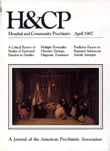Training Child Psychiatrists in Rural Public Mental Health
Abstract
Lack of appropriate training in both public mental health service and rural mental health service is a major factor in the critical shortage of child psychiatrists in rural settings. The authors describe a residency training program in rural public mental health designed to help alleviate that shortage. The program familiarizes fourth-year residents in child psychiatry with the clinical, political, and social aspects of rural public mental health services through didactic and supervisory sessions as well as an eight-month practicum experience involving provision of inservice training and administrative and case-related consultation to staff of mental health agencies. An assessment of the program indicated that participants felt it was beneficial, but the program was only partly successful in increasing the number of child psychiatrists entering practice in rural areas. The authors urge that residency programs in child psychiatry give priority to training child psychiatrists for work in rural settings.
Access content
To read the fulltext, please use one of the options below to sign in or purchase access.- Personal login
- Institutional Login
- Sign in via OpenAthens
- Register for access
-
Please login/register if you wish to pair your device and check access availability.
Not a subscriber?
PsychiatryOnline subscription options offer access to the DSM-5 library, books, journals, CME, and patient resources. This all-in-one virtual library provides psychiatrists and mental health professionals with key resources for diagnosis, treatment, research, and professional development.
Need more help? PsychiatryOnline Customer Service may be reached by emailing [email protected] or by calling 800-368-5777 (in the U.S.) or 703-907-7322 (outside the U.S.).



